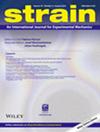基于实验应变的振动控制,采用阶梯法获得疲劳应变极限
IF 2.4
3区 材料科学
Q2 MATERIALS SCIENCE, CHARACTERIZATION & TESTING
引用次数: 3
摘要
本研究将等幅疲劳试验与应变控制技术和阶梯法相结合,以评估疲劳应变极限(FSL)。应变控制通过连接到试样缩小截面中心的应变计对失效进行停留疲劳测试。本文详细介绍了振动弯曲台的楼梯试验程序,包括参数选择。结果分析基于核密度估计,用于访问非参数分布上的FSL。选择具有疲劳区的低碳钢试样来评估FSL统计特征。结果突出了应变控制阶梯法达到FSL的效率。本文章由计算机程序翻译,如有差异,请以英文原文为准。
Experimental strain‐based vibration control to obtain the fatigue strain limit by the staircase method
This study is a combination of constant amplitude fatigue experimental tests with strain control technique and staircase method to assess the fatigue strain limit (FSL). The strain control provides a dwell‐fatigue test to the failure by a strain gauge bonded to the reduced section center of the specimen. A staircase test procedure with a vibration bending bench is detailed in this work, including parameters selection. The result analysis is based on kernel density estimation, used to access the FSL on non‐parameter distribution. Low‐carbon steel specimens with fatigue zone were selected to evaluate the FSL statistical features. The results highlight the efficiency of the strain‐controlled staircase method to reach the FSL.
求助全文
通过发布文献求助,成功后即可免费获取论文全文。
去求助
来源期刊

Strain
工程技术-材料科学:表征与测试
CiteScore
4.10
自引率
4.80%
发文量
27
期刊介绍:
Strain is an international journal that contains contributions from leading-edge research on the measurement of the mechanical behaviour of structures and systems. Strain only accepts contributions with sufficient novelty in the design, implementation, and/or validation of experimental methodologies to characterize materials, structures, and systems; i.e. contributions that are limited to the application of established methodologies are outside of the scope of the journal. The journal includes papers from all engineering disciplines that deal with material behaviour and degradation under load, structural design and measurement techniques. Although the thrust of the journal is experimental, numerical simulations and validation are included in the coverage.
Strain welcomes papers that deal with novel work in the following areas:
experimental techniques
non-destructive evaluation techniques
numerical analysis, simulation and validation
residual stress measurement techniques
design of composite structures and components
impact behaviour of materials and structures
signal and image processing
transducer and sensor design
structural health monitoring
biomechanics
extreme environment
micro- and nano-scale testing method.
 求助内容:
求助内容: 应助结果提醒方式:
应助结果提醒方式:


